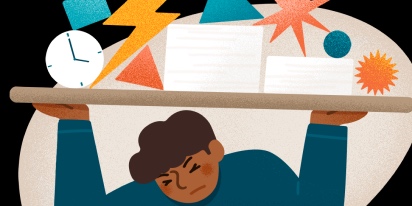
Burnout is more than just feeling stressed or tired. It is a state of physical, mental and emotional exhaustion that can leave you feeling drained, hopeless and unmotivated. The main signs and symptoms of burnout include:
.Feeling tired all the time
.Lack of motivation or interest in things you used to enjoy
.Feeling like you're not making any progress
.Increased absenteeism or delay
.Difficulty concentrating or making decisions
.Changes in appetite or sleep patterns
.İsolating yourself from others
.Experiencing physical health problems such as headaches, chest tightness, neck pain, back pain, and nausea
.Increase alcohol and nicotine use
.Apathy, boredom, and restlessness
If you're experiencing any of these symptoms, it's crucial to take action to fix the problem before it gets worse.
How to Get Rid of Burnout?
If you're already feeling drained, it's crucial to take action to fix the problem. Effective burnout recovery strategies can help you understand what's causing the problem, restore your mental strength, and combat feelings of cynicism.
Identify the Cause
Take some time to evaluate what contributes to burnout about your job. Factors that often play a role include working too much, poor relationships with supervisors or coworkers, conflict in the workplace, poor support from management, and excessive workload. As you become more aware of the cause, you can take steps to help alleviate it. Some of these may be more difficult to address, but you can start by talking to your employer about ways to help you manage workplace stress and reduce interpersonal conflicts.
Take Time for Yourself
Burnout is often linked to high levels of long-term interpersonal stress. Therefore, people who work in people-oriented jobs are more likely to experience burnout. If you've reached a point where you develop a negative attitude about others and feel frustrated and withdrawn, try to take some time for yourself. Spending time alone doing things you enjoy can be a great way to re-energize, especially if you tend to be more introverted.
Leverage Effective Coping Skills
You can't eliminate all stress, but you can develop more effective ways to deal with it. How you think about different situations can affect how you feel about them.Cognitive reframing can be a helpful strategy that can help you change your perspective on situations that cause stress. 1 For example, reframing a situation as a learning opportunity rather than a burden can help you approach challenges with less anxiety.
Get Support From Your Loved Ones
While a little solitude can be helpful, it doesn't mean you have to distance yourself from your loved ones. Negative social interactions often play an important role in causing burnout, but positive and supportive social connections can be an important buffer against it.Leaning on your social support system can also ease some of the pressure you're feeling. Talking to your friends and family about what you're going through can help you feel less alone in your experiences.
Talk to a Professional
If you're having trouble managing burnout on your own, it's essential to seek professional help. One study found that psychodynamic group therapy and cognitive group therapy were effective in reducing symptoms of work-related depression. However, there are a number of additional types of effective psychotherapy that can be of great help. A therapist can help you identify the causes of your stress and develop a plan to address them. If you feel overwhelmed, don't be afraid to ask for help.
Best Burnout Prevention Strategies
One study found that some of the most commonly used tactics for recovering from burnout include:
- Taking care of one's physical health
- support from colleagues
- participate in hobbies
- Finding comfort in personal relationships
- creating boundaries
- taking time off work
- Rediscovering passion and finding meaning in work
- Setting realistic expectations
- Laughing and using humor
- Burnout is associated with many negative consequences, such as low job satisfaction, high turnover, absenteeism, decreased productivity and poor job quality. Finding ways to prevent burnout can help minimize its impact on your career and mental health, but it's also important to focus on strategies to effectively improve burnout if you're already feeling burnt out.
If self-help strategies aren't providing enough relief, talk to mental health professional to devise a plan to address these feelings of burnout.
